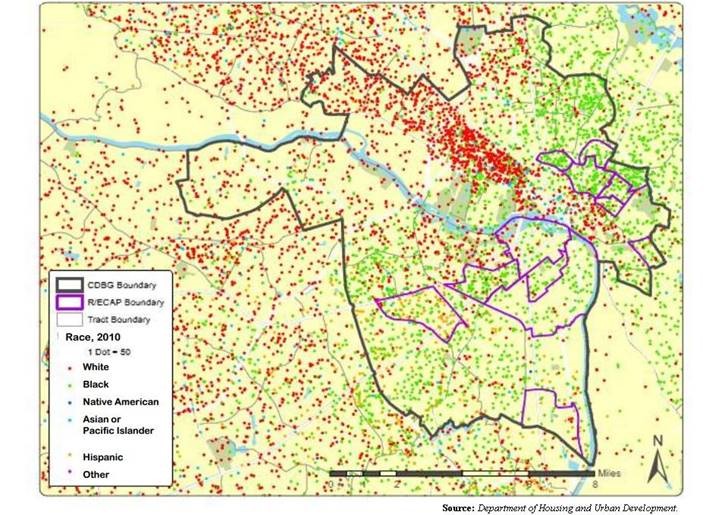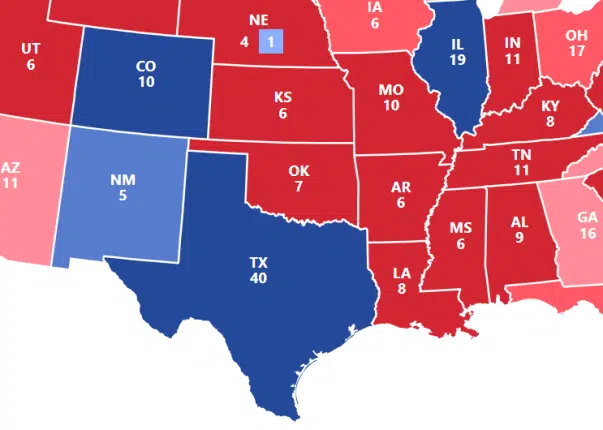“None of the funds made available by this Act may be used by the Department of Housing and Urban Development to direct a grantee to undertake specific changes to existing zoning laws as part of carrying out the final rule entitled ‘Affirmatively Furthering Fair Housing’ … or the notice entitled ‘Affirmatively Furthering Fair Housing Assessment Tool’…”
That is Section 234 of HR 3354, the House-passed 2018 omnibus spending bill, ripping the guts out of the 2015 Obama era housing rule that rezones municipalities that receive community development block grants along income and racial criteria.
The regulation conditions $3 billion of yearly community development block grants on 1,200 recipient cities and counties rezoning neighborhoods along income and racial criteria.
Specifically, it does so by directing municipalities “to examine relevant factors, such as zoning and other land-use practices that are likely contributors to fair housing concerns, and take appropriate actions in response” [emphasis added] as a condition for receipt of the block grants.
And now Congress is on the verge of rendering the rule impotent via the 2018 spending bill, which Americans for Limited Government President Rick Manning supports. In a statement, Manning said, “we strongly support that rider’s inclusion or expansion in the final 2018 funding bill. This is a perfect way for Congress to begin to reassert its rightful Article I constitutional prerogatives, by defunding those regulations that go far beyond the scope of federal law.”
Having followed this regulation since it was proposed in 2013, one of my favorite activities has been chatting with journalists who swear this regulation has nothing to do with zoning, only to read the regulation back to them word-for-word, proving that zoning decisions are absolutely a metric for complying with the rule.
To be fair, those journalists might just be repeating what Obama administration officials were saying at the time. For example, by then-Department of Housing and Urban Development Secretary Julian Castro before the House Financial Services Committee in 2015, saying “This is not about changing zoning laws, planning laws — anything like that.”
When the Senate debated a similar rider last year, which passed 87 to 9, it was met with Senators on the floor, swearing that the regulation had nothing to do with zoning and that the purpose of the amendment was to clear up “confusion” and to set the matter to rest.
But the rule was never confusing. The regulation mentions the need for local zoning decisions to comport with the terms of the rule no less than six times. Here’s what it says specifically about zoning:
- “[Community Development Block Grant] [p]rogram participants will also assess whether laws, policies, or practices limit fair housing choice, as well as the role of public investments in creating, perpetuating, or alleviating the segregation patterns revealed by the assessment. Examples of such laws, policies, or practices include, but are not limited to, zoning, land use, financing, infrastructure planning, and transportation.” [emphasis added]
- “Consistent with long-standing judicial guidance regarding AFFH, the proposed rule is designed so that program participants undertake a process that informs and engages the public and allows program participants to make educated judgments regarding the appropriate strategies and actions that are consistent with their obligations to affirmatively further fair housing. In doing so, it directs them to examine relevant factors, such as zoning and other land-use practices that are likely contributors to fair housing concerns, and take appropriate actions in response.” [emphasis added]
- “Revising the [Assessment of Fair Housing] AFH (§ 5.164). New § 5.164 establishes the minimum criteria that will require a program participant to revise its AFH. Paragraph (a) of this section provides that if a program participant experiences a significant material change in circumstances that calls into question the continued validity of the AFH, then the program participant must revise its AFH…Paragraph (a)(1) provides examples of what a significant material change in circumstances may be, which would include… the jurisdiction has made significant policy changes, such as significant changes related to zoning, housing plans or policies, or development plans or policies…” [emphasis added]
- “This rule is needed to facilitate efforts to overcome barriers to fair housing choice. There are many different types of impediments to fair housing choice, including building and zoning codes, processes for site selection for low-income housing, lack of public services in low-income areas, less favorable mortgage lending for minority borrowers, and lack of public awareness of rights and responsibilities associated with fair housing. Some of these impediments may prevent people from moving out of racially concentrated areas of poverty and neighborhoods that perpetuate disparities in access to community assets.”
- On the impact of the regulation: “Finally, in terms of quantifying the effects of the proposed rule, there is uncertainty about the potential impacts of whichever policy is selected by a program participant. For example, inclusionary zoning policies—one potential action that jurisdictions might take in this context—have been implemented by a number of communities across the country, often for the purpose of advancing fair housing goals. Research assessing these efforts is mixed, with some studies suggesting they increase prices and decrease housing stock in the long run, some studies showing they have no effect, and other studies indicating they increase the supply of multifamily housing units. For this example, as well as the other policies program participants might consider in the course of their AFFH planning process, the impact will depend on a complex interaction of a broad set of judgments and decisions by the jurisdiction, other jurisdictions, private and non-profit actors, and families, both in protected classes and not. These can differ across regions and families in ways that are impossible to predict in advance. Accordingly, impacts will be revealed in the months and years following policy implementation.” [emphasis added]
Absolutely nothing to do with zoning? C’mon. It has everything to do with zoning and interfering with local government decision-making.
Should the rider proposed by the House pass, the Department of Housing and Urban Development should just go ahead and rescind the regulation altogether or significantly pair it down.
Congress never intended to condition community development block grants on zoning decisions, and in the 2018 spending bill, members need to finally speak on that issue. Otherwise, this Obama era HUD regulation will be used, perhaps not by the Trump administration, but by a future liberal administration to stage a federal takeover of local zoning decisions. It will happen, unless Congress acts now.
If there’s any doubt, read the regulation. It absolutely governs local zoning. And this could be one of Congress’ last chances to rein it in.
Robert Romano is the Vice President of Public Policy at Americans for Limited Government.







